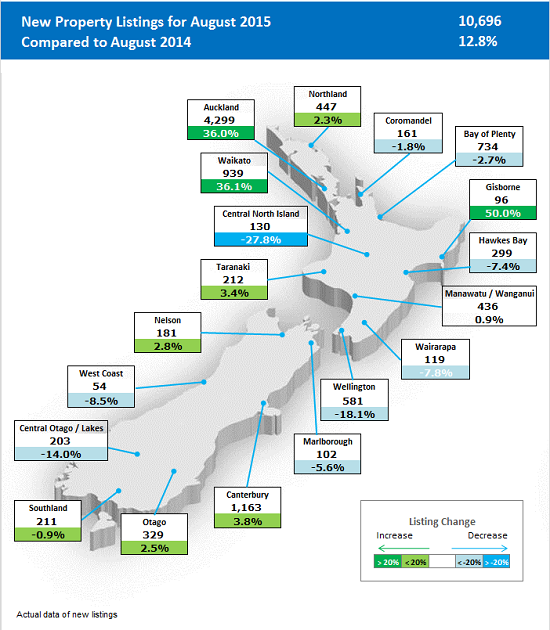
Spring has sprung early for the property market with a big increase in the number of new listings and asking prices continuing to rise on property website Realestate.co.nz in August.
Across the entire country 10,696 homes were newly listed for sale on Realestate.co.nz in August, up 11% compared to July and up 13% compared to August last year.
The increase in new listings was particularly strong in the upper North Island, with the number of new listings in Auckland jumping from 3,649 in July to 4,299 in August, a 36% increase on August last year.
New listings were also up substantially in the Waikato with 939 new listings in August, a 36% increase on August last year.
Around the rest of the country (see chart below) new listings were a mixed bag in August compared to a year ago, except in Wellington where 581 dwellings were newly listed for sale in August, the lowest number in eight months and down 18% compared to August last year
In Canterbury 1163 homes were listed for sale in August, down from 1224 in July but up 4% compared to the 1120 listed in August last year.
Asking prices of newly listed properties continue to set new records, with August's national average asking price* of $568,215 beating July's record high by 5.5%.
In Auckland the average asking price was also at a new record of $832,613 and eight of the 19 regions around the country had record asking prices in August.
These included Waikato, ($403,640), Wellington ($479,399) and Canterbury ($475,066).
However although asking prices remain high and an increasing amount of stock is coming on to the market, it isn't hanging around long.
The national inventory** of stock on the website was just 17 weeks in August, its lowest level since Realestate.co.nz starting tracking inventory in 2007.
"The low inventory does not mean that there are fewer homes on the market, but rather that the turnover is faster," Realestate.co.nz chief executive Brendon Skipper said.
*Realestate.co.nz uses a truncated 80% mean to calculate its average prices. This removes the top 10% and bottom 10% of prices to calculate an average, which is then seasonally adjusted. In the current market this is likely to produce a higher figure than a median price.
**Inventory is a theoretical measure based on how long it would take to sell all of the properties listed on the website at the current average rate of sale (in weeks). The long term average since 2007 is 35 weeks. In August this year it was just 17 weeks.
Housing inventory
Select chart tabs
14 Comments
Sounds like it is still a good idea to buy investment properties in Auckland. Bricks and mortar are always safe bets. We are not making any more land in NZ.
Is this a parody of mindless cliche-parroting or real mindless cliche-parroting? I just can't tell any more.
You are actually joking right?
Not with sell side building up... That tells me balance is moving toward an easing of prices
Lots of wishful thinking on both sides :)
the amount of listings is interesting in AKL, why so many?
is it churn
investors wanting to take the money off the table before the downturn
people wanting to take the money and leave auckland
overseas investors taking the money to pay down debt or move to new markets
without any information on buyers or sellers guess we will never know for sure
When I see sell orders loading up on a stock I own I dont need to question the motives of the seller, just know that more people are wanting to exchange the stock for cash at that given price, which you dont do if you think the price is still heading higher
with stock you can see the depth so you have an idea if there are more sellers or buyers and price ranges
as well you have a host of other data to let you know if it will grow in price or it is time to take some money off the table
with houses this info is kept by RE and not open to the public so you can only look back after a couple of months and go Hmm so thats what happened
So the number of folks wanting to exit Auckland and Hamilton is only exceeded by the number wanting to exit Gisborne?
Compared to 12 months ago generally yes... A more accurate statement could be yoy motivation to exit the property market is highest in Gisbone, followed by Auckland and Hamilton.
Gisborne because population is declining and its isolated and cut off from the rest of the country, doesnt have any 'feeder town' nearby to supply people...
Auck and Ham both exhibiting prices that are generally too high for what the local ecomony warrants, even if local ecomony is say 10% stronger than NZ ave in auck, with prices more than double they are unjustified so hence people wisely taken cash off the table.
It is very clear that it seems to be a good moment to sell now before the music stops. Just look globally to the economy and read the recent surveys about NZ business confidence (ANZ, BNZ) and you see how 'great' the things are.
I'm involved in the manufacturing and i talk to other guys (suppliers, contractors etc) and all are confirming the major slowdown...
Falling NZD is making the imported components very expensive - increasing manufacturing costs.
There are redundancies taking place, and that will have an impact sooner or later...
It starts to rain ... and soon banks will take the umbrellas away...
agree the world is heading for a slowdown, markets have turned bear and apart for some spots growth has slowed
will be interesting to see how countries now cope as many have borrowed hand over fist ours included
already starting to happen in Australia
http://www.perthnow.com.au/realestate/news/perth-housing-market-leads-r…
Exactly, it's too much debt that can add volatility, just look at the Chinese sharemarket.


We welcome your comments below. If you are not already registered, please register to comment
Remember we welcome robust, respectful and insightful debate. We don't welcome abusive or defamatory comments and will de-register those repeatedly making such comments. Our current comment policy is here.